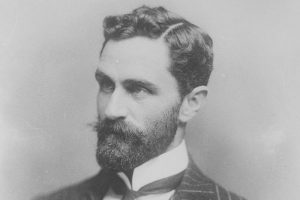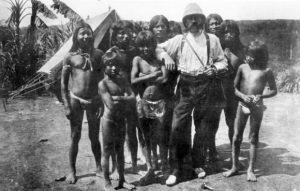Today in Irish History, August 3 1916, Roger Casement is Executed

A short article on Roger Casement. Executed today 100 years ago. By John Dorney
Roger Casement, hanged on August 3, 1916 was perhaps the most unusual story among the 16 men executed for the Easter Rising.
Casement, originally from County Antrim, was of Protestant and unionist origin. Though not the only rebel activist from this background, Bulmer Hobson and Ernest Blythe were two more, unlike them, Casement was not an IRB man or a cultural nationalist.
Casement made his name as a humanitarian in the service of the British Empire but later turned against it.
Casement made his name in the British Colonial Service, and as consul, investigated Belgian abuse of native workers in the Congo (then the private realm of King Leopold II) where notoriously brutal Belgians rubber planters, among other things, hacked off the limbs of African workers who did not meet quota of rubber required, or who tried to escape. He was later sent to Brazil and Peru where he also investigated the abuse of native workers there by rubber plantation owners. So dangerous was the work that he ultimately had to leave Peru under threats of the rubber bosses. He was later knighted for his humanitarian work.
So Casement was the embodiment of British Empire’s self image as a benevolent, liberal empire – distinguished, as they saw it from the other more brutal, less humane European colonists. But this worldview, which Casement himself bought into for many years, did not last. He ultimately turned against Empires in general, apparently as a result of British counterinsurgency practices during the Boer War. In 1907 he wrote;
I had accepted Imperialism, British rule was to be extended all over the world at all costs because it was best for everyone under the sun and those who opposed this extension ought to be rightly ‘smashed’…Well the Boer War gave me qualms at the end – the concentrations camps bigger ones at the end, and finally when up in the Congo forests where I found Leopold I [King of Belgium] I also found myself, the incorrigible Irishman!

This began his conversion into an Irish nationalist.
By the time of the Home Rule crisis, 1912-14 he was back in Ireland. In opposition to the Ulster Covenant, which collected half a million signatures against Home Rule, Casement, with a Presbyterian minister named Armour, collected about 12,000 signatures of northern Protestants in favour of Home Rule. This stance must have alienated him from many of his Protestant kith and kin in Ulster.
When unionists armed in the Ulster Volunteers to prevent Home Rule, Casement was to the forefront in founding the nationalist Irish Volunteers, and sat on their governing committee. He later came up with much of the finance to import guns for them at Howth.
He seems to have become involved around this time with the IRB via Bulmer Hobson and then, to some degree with the secretive IRB military council which was planning a Rising before the Great War ended. Casement, on the outbreak of war, went to Berlin to get German aid, accompanied by Joseph Plunkett who went on behalf of the military council.
He lobbied for Home Rule among his fellow Ulster Protestants and later joined the Irish Volunteers and sought German aid.
Casement tried to recruit an Irish Brigade for Germany from Irish prisoners of war but got a very poor response, only about 60 men joined. Unlike the hardcore insurrectionists in Ireland, Casement was against launching a Rising without direct German military assistance, his preference being a landing of not less than 12,000 German troops.
By the time he actually went to Ireland on a u-boat in April 1916 ,he had decided to try to stop the Rising, which he was convinced would be a failure in the absence of German troops. Not that he was especially impressed with the Germans commitment to Ireland, writing in his diary;
“My last day in Berlin!” he wrote in this diary’s last entry for the 11th April 1916 as he departed for Ireland and the fate he was at least half-expecting to find: “Thank God – tomorrow my last day in Germany – again thank God, an English jail, or scaffold, would be better than to dwell with these people longer. All deception – all self-interest.”
He tried to call off the Easter Rising of 1916 but was hanged for treason for his involvement with Germany
He landed at Banna Strand, County Kerry, but was soon arrested by the RIC on Good Friday 1916 and taken to London as prisoner. Roger Casement later asserted that the British Army Intelligence officers who interrogated him refused him permission to make a public declaration calling on the Volunteers to call off the rebellion saying of radical nationalism, ‘ it’s a festering sore, it’s much better that it come to a head’.
He stood trial for treason and in his defence argued that he had been trying to call off the Rising. At this point the British Government began leaking the ‘black diaries’ with details of Casement’s homosexual adventures on his travels around the world.
Controversy continues to surround his ‘Black Diaries’
The traditional nationalist version is that the dairies were forged to blacken Casement’s name. Casement never married and there were strong rumours of a number of same-sex love affairs. Whether he also had hundreds of sexual encounters with boys and young men across Africa and South America as he allegedly wrote in his private diaries we will probably never know. Forensic tests in 2002 suggested that the diaries were genuine, but they may well have been fantasies rather than records of real events.
In 1916, such allegations apparently merited the death sentence more than mere treason against the Crown. Without the ‘black diaries’ he may well have been granted ‘clemency’ as he had influential friends in Colonial Service and the literary world. Such figures as WB Yeats and Arthur Conan Doyle lobbied for his reprieve. But it was not to be.
He was hanged at Pentonville Prison, in London on August 3, 1916. In 1965 his body was brought back to Ireland and buried with military honours in Glasnevin Cemetery as an Irish patriot.